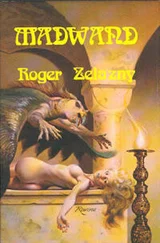Roger Zelazny - A Farce To Be Reckoned With
Здесь есть возможность читать онлайн «Roger Zelazny - A Farce To Be Reckoned With» весь текст электронной книги совершенно бесплатно (целиком полную версию без сокращений). В некоторых случаях можно слушать аудио, скачать через торрент в формате fb2 и присутствует краткое содержание. Жанр: Фантастика и фэнтези, на английском языке. Описание произведения, (предисловие) а так же отзывы посетителей доступны на портале библиотеки ЛибКат.
- Название:A Farce To Be Reckoned With
- Автор:
- Жанр:
- Год:неизвестен
- ISBN:нет данных
- Рейтинг книги:5 / 5. Голосов: 1
-
Избранное:Добавить в избранное
- Отзывы:
-
Ваша оценка:
- 100
- 1
- 2
- 3
- 4
- 5
A Farce To Be Reckoned With: краткое содержание, описание и аннотация
Предлагаем к чтению аннотацию, описание, краткое содержание или предисловие (зависит от того, что написал сам автор книги «A Farce To Be Reckoned With»). Если вы не нашли необходимую информацию о книге — напишите в комментариях, мы постараемся отыскать её.
A Farce To Be Reckoned With — читать онлайн бесплатно полную книгу (весь текст) целиком
Ниже представлен текст книги, разбитый по страницам. Система сохранения места последней прочитанной страницы, позволяет с удобством читать онлайн бесплатно книгу «A Farce To Be Reckoned With», без необходимости каждый раз заново искать на чём Вы остановились. Поставьте закладку, и сможете в любой момент перейти на страницу, на которой закончили чтение.
Интервал:
Закладка:
The rain came down in an incessant chatter that was like moist wind gods talking to each other with loose windows for tongues. Droplets dribbled off mantels and cornices and anything else that ended in a point.
The wind drove the rain and broke big drops into little drops.
The water level rose steadily throughout Venice. Water overflowed the canals and flooded out into the squares and piazzas. It filled San Marco's Square to a depth of three feet, and it continued to rise. It was not the first time Venice had been bothered by rain and floods, but this was by far the worst anyone had seen.
Strong winds out of the northeast, laden with Arctic frost, blew steadily for days, and showed no signs of letting up. The republic's chief weather forecaster resigned his well-paid hereditary post, so distasteful had his work of predicting disaster become to him. People were praying to saints, devils, effigies, whatever they could think of, hoping to get some relief. Just to make matters worse, plague had been reported in some parts. And there were claims that Mongol outriders had been seen just a day's ride away, and there was no telling how quickly they were advancing.
The Venetians were exhausted by their constant worries, frightened by the huge forces shaping up outside of the republic, and suspicious even of each other. The usual ceremonies in honor of certain saints had fallen into abeyance. Churches were taken up day and night with prayers for the salvation of the city, and with anathemas delivered against the Mongols. Church bells tolled incessantly. This in turn spurred an air of desperate gaiety.
It was a brilliant season of parties, masked balls, and fetes. Carnival reigned constantly, and never had Venice shown herself to greater advantage. Despite the storms, candles gleamed brightly in the mansions of the rich, and music could be heard up and down the canals. People hurried through the rainswept streets in cloak and half mask, on their way from one parry to the next. It was as if one last fling was all that remained for the proud old city.
A strange incident occurred one day. A workman sent out by the city to assess storm damage discovered a hole in one of the dikes near the Arsenal. No water was coming through it, however.
Through the opening there came a blinding yellow light, and the workman could see something indescribable in silhouette on the other side. It appeared to have two shadows. The man ran away and told others what he had seen.
A group of scholars came to study the phenomenon. The hole in the dike had grown larger; the brilliant yellow color had faded. Now the hole showed a clear and unearthly blue, even though stormy rain clouds and dun- colored earth should have been visible through it. This hole was like an opening through everything, earth and sky alike.
The scholars studied it with trepidation. Little fragments of earth and sand on the edge of the hole were being pulled into it. As an experiment, they tossed a stray dog into the hole; the dog disappeared as soon as he broke the invisible plane of its surface.
One of the scholars said, "From a scientific point of view, this hole seems to be a rent or tear in the fabric of existence."
Another objected on a quibble. "How could the fabric of existence tear?"
"That we don't know," the first replied. "But we can infer that something tremendous is happening in the Spiritual Realm, something so enormous that it is having its effect on us down here on the physical plane of mundane existence. Not even reality is to be trusted any longer, so strange has life become."
More reports came in of other holes in the fabric of reality. The phenomenon was called the Anti-Imago, and examples of it seemed to be springing up everywhere, even in the interior chapel of San Marco's, where there was a hole almost three feet wide pointing obliquely downward and leading to where nobody could ascertain without taking the oneway trip into it.
A church sexton reported a peculiar occurrence. A stranger had entered the building, and something about him seemed either more or less than human. Perhaps it was his ears, or the strange tilt to his eyes.
This being walked about the church and its immediate area, looking at outbuildings and making notes on a roll of parchment. When the sexton demanded to know what he was doing, the stranger said, "Just taking some measurements, so I can report the situation to the others."
"What others?"
"The others like me."
"But why should you and the others be interested in the state of our buildings?"
"We're provisional life-forms," the stranger said, "me and the others like me, so new we haven't even gotten a name yet. There's a chance we'll get to take over — reality, that is—and in that case we inherit what you leave behind. We thought it would be best to be prepared, so we are doing an inventory."
Chapter 7
The pilgrims huddled in the common room in the inn, taking turns stoking the fire while they awaited their next orders. They should have been triumphant, happy, for they had finished their contest. But the weather trivialized their victories.
They had gone through hardships to get here, and now they were here and things were lousy. It wasn't the way it was meant to be. And none felt this more keenly than Azzie, who was being cheated of his story, though he couldn't figure out how it was happening.
That evening, as Azzie sat near the fire and tried to think what to do next, there was a rap at the inn door.
The landlord called out, "We are full up, please go elsewhere!"
"You have someone within I would talk with," a pleasing female voice called out.
"Ylith!" Azzie called out. "Is that you?" He gestured peremptorily to the landlord, who threw back the door with bad grace. A few bucketsful of rain blew in, and with them came a beautiful black-haired woman whose features were balanced between the angelic and the demonic, making her look very appealing indeed. She wore a simple yellow dress covered with appliqued violets, and over it a sky blue cloak with a silver lining, a saucy red wimple about her head.
"Azzie!" she cried, crossing the room. "Are you all right?"
"Of course," Azzie said. "Your concern touches me.
Have you perhaps changed your mind about a spot of dalliance?"
"Same old Azzie!" Ylith said with a chuckle. "I came here because I believe in fairness in all matters, especially those concerning Good and Bad. I think someone is doing you a disservice." Ylith then told how she had been captured by Hermes Trismegistus, who had given her to a mortal named Westfall. She told how she had been shut up in Pandora's box, and how with Zeus' help she had escaped.
"I know you think of Hermes as a friend," Ylith said, "but it seems he is plotting against you. The rest of the Olympians may be in on it, too."
"There's nothing much they can do from Afterglow," Azzie said.
"But the old gods are no longer in Afterglow. They've escaped! And I'm afraid I'm responsible, albeit unwittingly."
"It could be those guys who are screwing everything up," Azzie said. "I had thought it was all Michael's doing — you know how he opposes even my smallest triumph — but what's going on is beyond him.
Someone has stirred up the Mongols, Ylith!"
"I don't understand why the Olympians are opposing you," Ylith said. "What difference does it make to them if you put on your immorality play?"
"The gods have a vested interest in morality," Azzie said. "But for others, not themselves. This interference of theirs is something else, I think. It wouldn't surprise me if this were the old gods' bid to return to power."
The weather was simply no longer to be tolerated. Azzie roused himself and looked into it. The most cursory inspection showed him that the storms didn't seem to be coming from any single source. They sprang up "in the north," where the weather mostly comes from. But what did that mean, the north? How far north? North of what? And what was there in the north that created the weather? Azzie decided he had better find out, and do something about it if possible.
Читать дальшеИнтервал:
Закладка:
Похожие книги на «A Farce To Be Reckoned With»
Представляем Вашему вниманию похожие книги на «A Farce To Be Reckoned With» списком для выбора. Мы отобрали схожую по названию и смыслу литературу в надежде предоставить читателям больше вариантов отыскать новые, интересные, ещё непрочитанные произведения.
Обсуждение, отзывы о книге «A Farce To Be Reckoned With» и просто собственные мнения читателей. Оставьте ваши комментарии, напишите, что Вы думаете о произведении, его смысле или главных героях. Укажите что конкретно понравилось, а что нет, и почему Вы так считаете.



